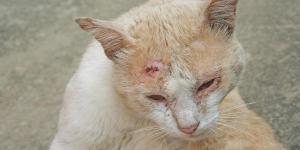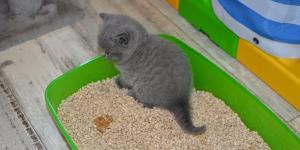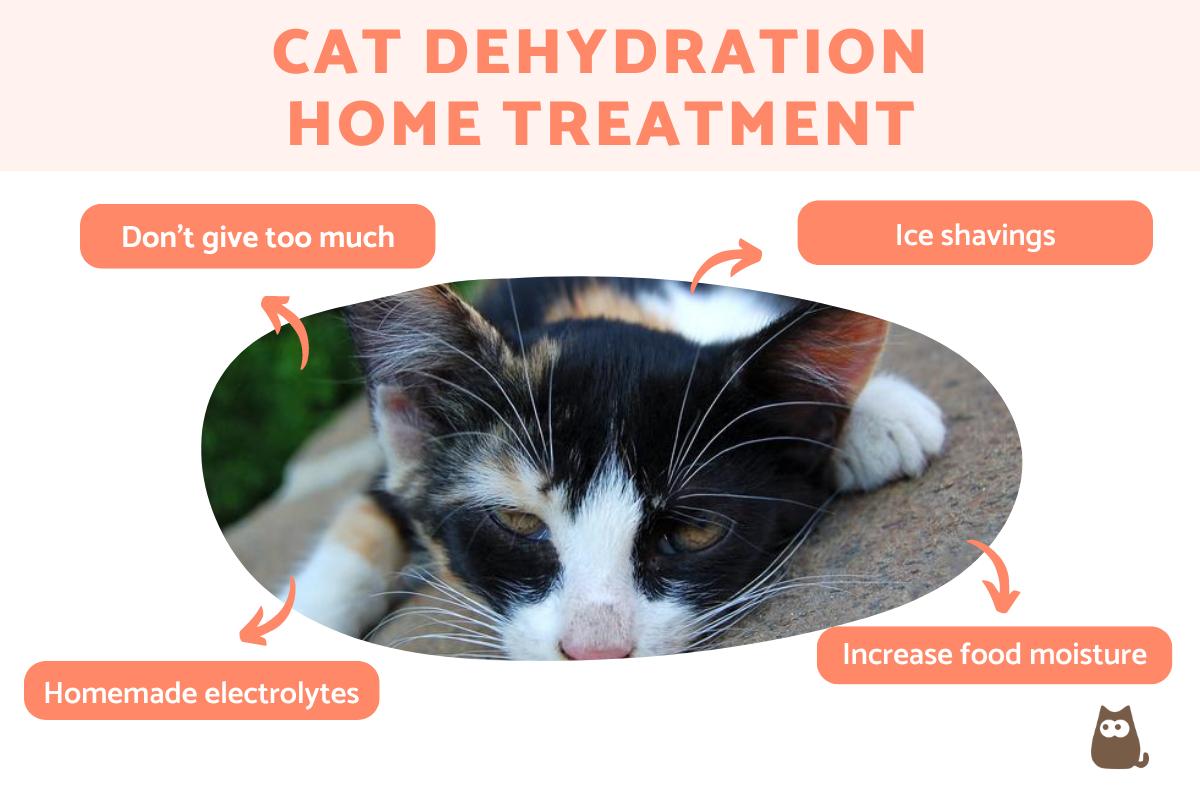Cat Dehydration Home Treatment Options

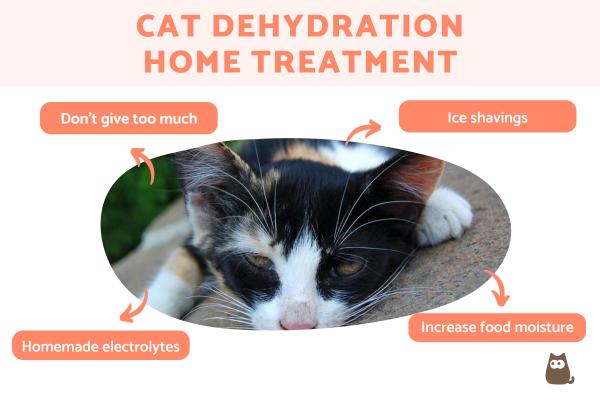

See files for Cats
Cats can become dehydrated easily, especially if they are not cared for properly. They are sensitive animals and can also be fussy with what they consume. Not only do we need to provide water, but it needs to be fresh and clean. If they only eat dry kibble, they won't have enough moisture in their food to cover their hydration needs. They also love to be in warm places, especially if the sun is shining. In summer, this can lead them to become too hot and dehydrated, especially if they overexert themselves. Dehydration can also be a symptom of various diseases, such as viral infections or gastrointestinal disorders.
If your cat is severely dehydrated, you will need to take them to a veterinarian. They may need clinical treatment such as fluid therapy. For cats with mild dehydration or if your veterinarian has recommended pushing fluids, AnimalWised provides these cat dehydration home treatment options. They include a recipe for homemade electrolytes for cats.
How to know if a cat is dehydrated?
A mammal's organism needs to have the right amount of water in order to develop healthily. If your cat does not ingest enough water, vomits due to illness or is exposed to excessive heat, there will be consequences. These consequences will result in the animal's body suffering a drop in fluid and electrolyte levels.
Due to a loss of electrolytes, the cat's body will struggle to distribute the essential nutrients it needs to all of its tissues. As a result, the animal will develop various physical signs that demonstrate the imbalance of its organism. The following signs can be interpreted as symptoms of dehydration in cats:
- Constant tiredness
- Dry gums
- Decay
- Panting
- Loss of appetite
If this dehydration is not treated quickly and properly, a feline can suffer severe damage to its kidneys which can lead to its body's immunity collapsing.
An official medical diagnosis of dehydration requires a complete blood and urine analysis. This analysis will help distinguish the degree of severity of the dehydration. However, if you suspect that your cat is dehydrated, there are some homemade easy remedies which you can try if you suspect that your cat is dehydrated. You can gently pinch the skin on the cat's back. If it quickly returns to its natural position, your cat is not dehydrated, if this pinched skin is however delayed in returning to its original state, it is very likely your feline is dehydrated. The exception to this rule is found in obese cats, in which the skin can return to its normal place even if they are suffering from a dehydration. In addition, if you notice that your cat's eyes are sunken and they have a dry mouth, these are both also clear signs of dehydration.
In all these cases, you can use home remedies for dehydrated cats as a supportive measure. However, you should not rely on these home remedies as treatment. If their dehydration is serious, we need to see a veterinarian to determine the cause and provide treatment for the underlying condition causing dehydration in the cat.
Do not give your cat too much water at once
Before we look at the best dehydrated cat treatment options, it is important to note what not to do. A dehydrated cat needs to consume water immediately in order to recover to its health. However, it is important to make sure you offer your cat water gradually if it is dehydrated. While a cat drinking a lot of water can be a sign of dehydration, if they ingests a lot of water all at once, it could harm their organism.
Forcing too much water can cause a cat to vomit, lose more fluid or result in an irritation of their digestive tract. When offering water to a dehydrated cat, place a small about of water in reach of the cat and make sure it is offered to it at a slow and gradual pace.

Ice shavings for dehydrated cats
As mentioned, dehydrated cats should consume water in small amounts to avoid vomiting and irritation of their stomach. An excellent home treatment for dehydrated cats is giving them ice shavings. This allows for the cat to consume small amounts of refreshing water at a controllable level. Depending on the cause of dehydration, the ice can also help them to cool down and reduce inflammation.
To give ice to a dehydrated cat, we need to take some, is take some ice and scrape it with a spoon or knife. This will produce some shavings of the ice which can be placed in the front of the cat's mouth to encourage them to drink.
Homemade elecotrolytes for cats
In addition to consuming fresh, clean water, to treat a dehydrated cat, it is necessary to replenish their electrolytes to restore balance in their bodies. In order to do this, you can find fluids or oral serums in some veterinary clinics or pet stores which are rich in electrolytes for cats.
If you are unable to get to a pet store or veterinary clinic, you can make homemade electrolytes for a dehydrated cat as a home treatment option. To do so, use the following homemade cat electrolyte recipe:
Ingredients
- 1 cup of water
- 1/4 teaspoon of salt
- 1/4 teaspoon of baking soda
- 2 tablespoons of sugar
Method for homemade cat electrolytes
- Boil the water, but turn off the heat and cover with a lid as soon as it starts to bubble.
- Mix in the salt (sodium chloride), baking soda (bicarbonate of soda) and granulated sugar (sucrose).
- Stir to let them dissolve into the mixture.
- Once completely dissolved, let cool.
You can refrigerate your homemade electrolytes for cats to let it cool. This may be more palatable for the cat. Administer with the help of an oral syringe by placing it at the side of the cat's mouth with their head tilted upright. Give small amounts gradually until they recover. Do not give too much at once and them out over time.
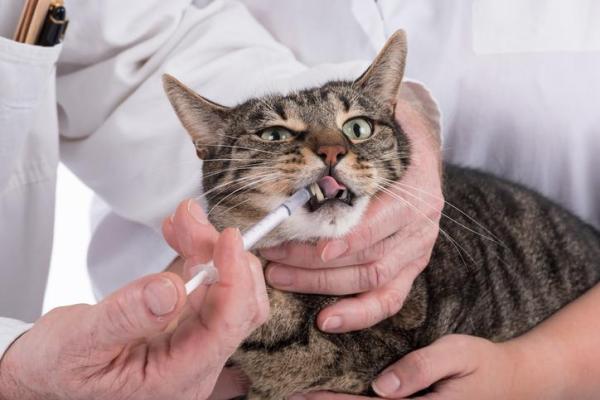
Alternative homemade dehydration cat serum
To replenish electrolytes and offer water to your dehydrated cat, you can make use of the recipe above. We provide an alternative option if your cat cannot have too much sodium. Your vet may need to check their potassium levels, but if they are fine, you can use the following ingredients for homemade electrolytes for cats:
- 1 liter of mineral water at room temperature
- 1 teaspoon of potassium salt
- 1/2 teaspoon of baking soda
- 3 tablespoons of honey
Preparation of serum for dehydrated cats
To prepare this serum, start by boiling a liter of water. Turn off the heat, add the other ingredients and let stand until it reaches room temperature. This homemade serum is valid for 24 hours, and should be kept in the refrigerator in a bottle or container with a lid, to avoid any unwanted contamination.
Remember to offer this homemade dehydration serum in small doses. If your cat does not accept it naturally through its water bowl, administer the serum through a syringe. If neither of these methods work, consult your veterinarian as soon as possible.
Feeding a dehydrated cat
A dehydrated feline usually loses their normal appetite and can develop certain digestive disorders due decrease of water left in its body. In these cases, dehydration can easily lead to malnutrition.
A dehydrated cat needs to eat a specific diet to prevent the aggravation of its case. If your cat is dehydrated, we suggest feeding it moist food which contains a lot of water. You also choose to make homemade wet food for your cat.
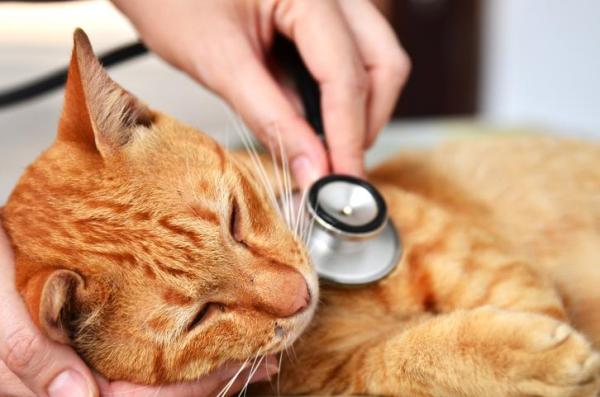
How to prevent dehydration in cats
Diagnosing dehydration in cats can be really complex, especially in cats which suffer from obesity. Many cats may be dehydrated and only show visible symptoms when the dehydration becomes more severe. For this reason, we reaffirm that prevention is the best home remedy to keep our pets healthy and happy.
Remember that your cat should have clean, fresh water at their disposal throughout the day. In addition, their drinker or water bowl must be washed daily to avoid any contamination. Kittens usually tend to drink less than adult cats, so we recommend feeding them a wet food diet.
Remember that the remedies mentioned above do not substitute the specialized attention of a veterinarian, especially in cases of severe dehydration in cats. If your cat is showing any changes in its diet or behavior, do not hesitate to go consult your veterinarian quickly.
If your cat generally doesn't seem to drink enough, you can use our related guide to encourage your cat to drink water.

This article is purely informative. AnimalWised does not have the authority to prescribe any veterinary treatment or create a diagnosis. We invite you to take your pet to the veterinarian if they are suffering from any condition or pain.
If you want to read similar articles to Cat Dehydration Home Treatment Options, we recommend you visit our Home Remedies category.


